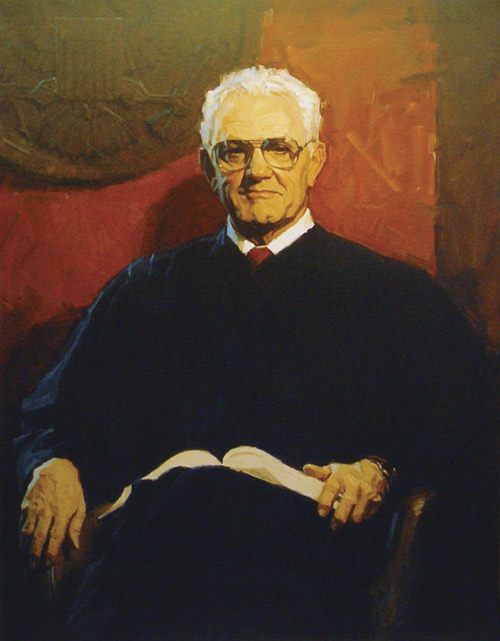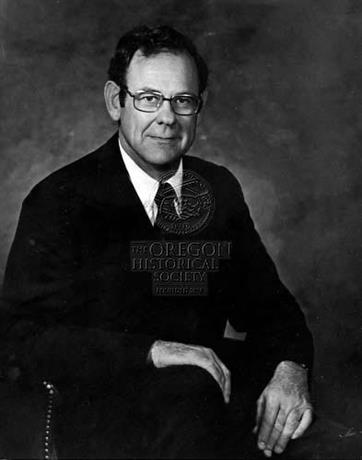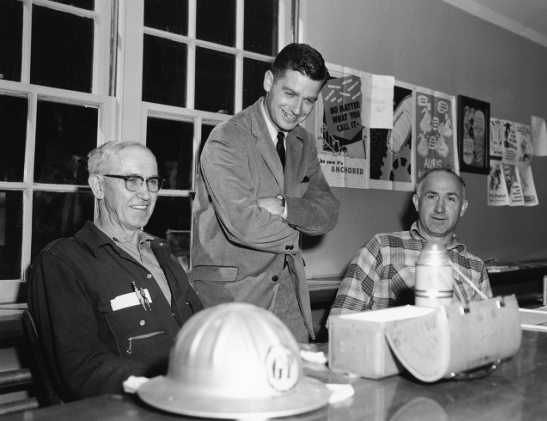In the annals of Oregon jurisprudence history, Otto Richard Skopil Jr. was among the most revered and important federal judges to serve in the region. He held several judicial positions in the U.S. District Court for the District of Oregon, from 1972 until near the end of his life in 2012. His most significant rulings involved cases that affected Native sovereignty rights, the limits of social discrimination, and the application of environmental protection laws.
Skopil was born in Portland on July 3, 1919, to second-generation German immigrants. The family moved to just outside Salem, and he graduated from Salem High School in 1937. A basketball and baseball star in high school, he attended Willamette University, completing his bachelor’s degree in 1941 and continuing studies at the university’s law school. World War II interrupted his studies, and Skopil enlisted in the U.S. Navy, where he served as an officer in the Stevedore Battalion. On his discharge from the navy in 1945, he returned to Willamette Law School, one of a class of three, earning a law degree in 1946.
Skopil went into private practice with Bruce Williams, whom he had known since grade school. They specialized as defense lawyers and took on many insurance cases, notably for State Farm Insurance. One of those cases, argued by Skopil in the U.S. Supreme Court in 1967, set precedence for the adjudication of interpleader cases—that is, instances when courts determine monetary liabilities. Mark O. Hatfield, who followed Skopil at Willamette University by two years, took notice of his fellow Republican’s legal talent and urged him to consider becoming a judge.
Skopil put Hatfield’s suggestion off, but in 1972—partly at Senator Hatfield’s suggestion—President Richard M. Nixon nominated Skopil for a federal judgeship in the District of Oregon. He easily won confirmation in the U.S. Senate, replacing Theodore Goodwin, who had been named to the Ninth District Court of Appeals. Skopil’s performance, especially his evenhanded approach to cases in his courtroom, marked him for higher judicial appointment, which came in 1979 when President Jimmy Carter elevated him to the Ninth District Court of Appeals. He remained in that position until taking senior judge status in 1986.
Several important cases were adjudicated in Skopil’s courtroom during his career. While on the District Court in 1978, he ruled in favor of antiwar protesters who had demonstrated at the Bangor, Washington, submarine base and were charged with trespassing on federal property. While on the Court of Appeals in 1987, he led a three-judge panel in the first national affirmation that AIDS victims could not be discriminated against in employment. His precedent-setting ruling in a California water case in 1998 required federal water managers to comply with environmental protections for endangered wildlife. In 1990, he led a three-judge panel in affirming the sovereignty rights of the Quinault Indian Nation in Washington State.
Skopil’s reputation led Chief Justice Warren Berger to enlist him in 1979 for service on a reform committee of the federal judiciary. He served as chair of the U.S. Conference Committee on the Administration of the Magistrate’s System and pioneered the employment of magistrate justices in the Oregon district in 1984, a reform that became a model for the national judiciary. Chief Justice William Rehnquist appointed Skopil chair of the federal judiciary’s Committee on Long Range Planning in 1990, which produced the most substantial report of suggested reforms to date in 1995.
His courtroom and judicial methods included written opinions that “shouldn’t have to be read” twenty or more times to be understood and the imperative that all persons in his courtroom should be treated with unprejudiced respect. Skopil was a conservative who believed that the judicial system should avoid any innovation that verges on creating law. He issued only two dissents in his judicial career, arguing that a dissent “minimizes the respect for the court system.” On his fairness in the courtroom, Judge Owen Panner commented that Skopil “had no enemies.” Judge Robert Jones simplified all of the plaudits Skopil received, calling him “a rare bird.”
Skopil was married fifty-six years to Janet R. Skopil. They had four children, two of whom became attorneys. Among the honors accorded Skopil was an honorary doctorate from Willamette University in 1993.
Otto Skopil died in Portland at the age of ninety-three on October 18, 2012.
-
![]()
Portrait of Judge Otto Skopil.
Courtesy Pioneer Courthouse Historical Society.
-
![]()
Judge Otto Skopil.
Courtesy U.S. Courts for the Ninth Circuit.
-
![]()
Otto Skopil, 2004.
Courtesy U.S. District Court of Oregon Historical Society. Photo by Owen Schmidt
Related Entries
-
![Alfred T. Goodwin (1923–2022)]()
Alfred T. Goodwin (1923–2022)
Alfred Theodore “Ted” Goodwin served as a judge for over sixty years an…
-
![Mark O. Hatfield (1922-2011)]()
Mark O. Hatfield (1922-2011)
As an Oregon legislator, secretary of state, governor, and United State…
Map This on the Oregon History WayFinder
The Oregon History Wayfinder is an interactive map that identifies significant places, people, and events in Oregon history.
Further Reading
Skopil, Otto Richard, Jr., interviewed by Clark Hansen, June 21, 2006. SR11151, Oregon Historical Society Research Library, Portland.
Zusman, Kelly. “Otto Skopil Jr. Helps Shape a Friendlier, More Efficient Judiciary.” Oregon State Bar Bulletin (April 2007).
Law, Adair.“Otto Skopil (1919-2012).” Oregon Benchmarks (Fall 2012).
Nelson, Valerie J. "Otto Skopil, obituary." Los Angeles Times, October 22, 2012





